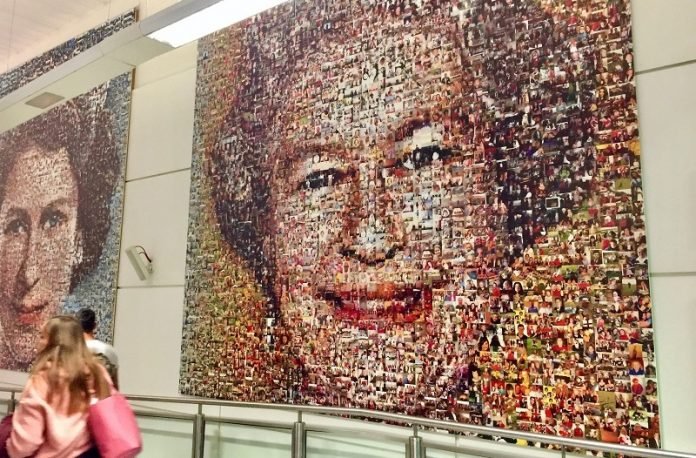
Queen Elizabeth II celebrates her 70th year on the throne this weekend, making her the first British monarch to have a Platinum Jubilee.
The country is marking the occasion with a four-day bank holiday weekend featuring a parade, derby, and concert with performances from Elton John and Diana Ross.
The jubilee closes yet another chapter of the queen’s reign, which has spanned some of the United Kingdom’s biggest moments in the 20th century.
And while Northeastern historians say she has been a stabilizing force during this time, they also question the fate of the institution she represents.
Elizabeth II became queen in 1952 at age 25 when Winston Churchill was prime minister.
Since then, her impact has been immeasurable, says Faissal Hameed, lecturer at Northeastern’s New College of the Humanities in London.
Elizabeth led the country through its transition from an imperial superpower to a commonwealth and, more recently, during Brexit and the COVID-19 pandemic. She has even managed to withstand the pressure of celebrity culture as it engulfs the monarchy.
“The queen has remained a constant, a stabilizing force,” Hameed says.
But Elizabeth’s reign is also notable for its sheer length. Now 96, Elizabeth II became the longest-reigning British monarch in 2015, when she surpassed Victoria’s reign of 63 years.
If she lives through 2024, she will become the longest-serving verified head of state, ahead of Louis XIV, who ruled France for 72 years.
But perhaps what’s even more remarkable is that throughout the decades she’s managed to maintain “universal love and respect,” as Hameed says, something he attributes to her role as a “national cement” for the Commonwealth—as well as her silence.
Hameed is the son of immigrants—his father was born in British India in 1955 at a time when the British flag was waving outside the hospital.
Hameed sees the queen as a force in maintaining a British identity within the country and throughout the Commonwealth.
Hameed says that within 10 years of becoming queen, Elizabeth II surpassed any other contemporary monarch in visits to other nations; in this way, the monarchy still functions as a means of maintaining diplomacy between Britain and its former colonies, including India.
Otherwise, the queen has very little political power, and rarely speaks on political matters, something Estelle Paranque, assistant professor at Northeastern’s New College of the Humanities in London, attributes to Elizabeth’s keen political intelligence.
“At times, very often, I wish she had some power. I think she would be better than some politicians,” Paranque says. “I think we’re missing her wisdom most of the time.” This silence, she says, is essential to the queen’s appeal.
Ironically, while the queen may be well loved, there may not be as much enthusiasm for the institution she represents—which, Paranque says, has failed to evolve with the times.
“Recently they’ve shown that they’re very entrenched in old ways,” she says.
Criticism comes from the monarchy’s failure to address the fact that it profited so heavily from colonialism and racism during the imperial era. “There’s a lot of pain” from the past, she says.
This tension came to a head in March, when Prince William and Catherine, Duchess of Cambridge, visited Jamaica and Belize for the jubilee.
As Time reports, the royal couple was met with protests, as Jamaicans called for the monarchy to make reparations for colonialism and for Jamaica to leave the Commonwealth.
During the visit, the couple appeared in a photo of them touching the hands of Black children through a fence in “what looked to many as some sort of white-savior parody,” BBC reported.
“As an institution, they’re going to have to really show that they want to push the monarchy forward into the next century,” Paranque says, “where it’s about forgiveness, reparation, building bridges and not burning them, and about inclusion.”
Within the U.K., as inflation rises—it may reach 10% this summer, BBC reports—and the wealth gap widens, the monarchy and the affluence that it represents can seem even more out of touch with the people’s interests.
“You have to evolve with your time and you have to evolve with the people’s concerns,” Paranque says, citing rising costs of food and fuel. “They’re not living what we’re living.”
Paranque speculates that upon the queen’s death, the public may begin to question the purpose of the monarchy more seriously than ever before, especially considering the fact that Prince Charles’ popularity pales in comparison to Elizabeth’s.
Paranque speculates that upon the queen’s death, the public may begin to question the purpose of the monarchy more seriously than ever before, especially considering the fact that Prince Charles’ popularity pales in comparison to Elizabeth’s.
“I don’t see the institution surviving,” she says. “I think it’s inevitable that the royal monarchy as an institution will be further cut back,” Hameed says.
This week, though, love of the queen takes precedence as the Jubilee celebrations take over London.
The moat in front of the Tower of London—just five minutes from Northeastern’s London campus—has been turned into a wildflower garden, the city is decorated with flags, and a new train line named for the queen has opened.
For her part, Paranque wonders about how the cost of the celebrations could have been spent elsewhere. But Hameed speculates that the celebrations, along with the monarchy itself, could help revive spirits during this difficult time.
That might do, for now.
“I think this will be a nice respite,” Hameed says, “when the country will come together.”
Written by Jessica Taylor Price.



